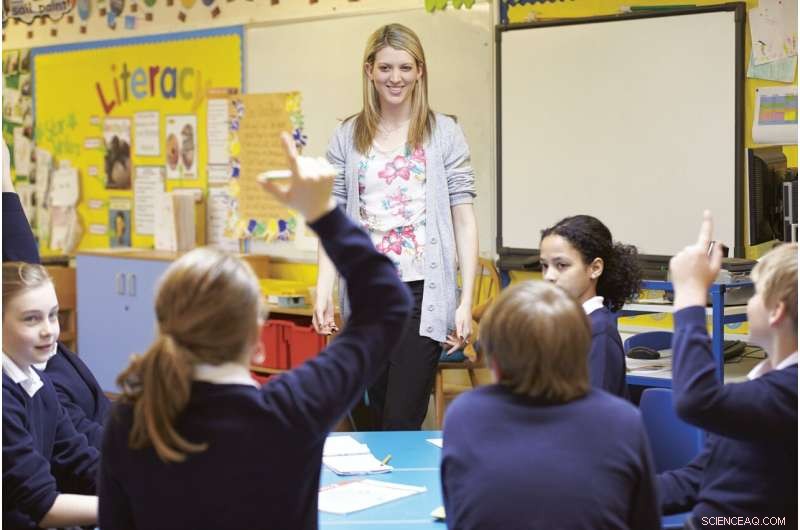
Credito:Pixabay/CC0 di dominio pubblico
Molti insegnanti attestano di essere stati chiamati alla professione per educare gli studenti e prepararli alla vita, non solo per fornire un servizio economico. Tuttavia, poiché l'istruzione è sempre più politicizzata e monetizzata, molti educatori sono spinti tra il fornire un bene economico e il fare ciò che amano. Un nuovo studio dell'Università del Kansas ha rilevato che ciò è particolarmente vero per gli insegnanti delle scuole cattoliche, che hanno sviluppato strategie per bilanciare la loro vocazione e professione.
L'istruzione è stata influenzata dal neoliberismo e dal postindustrialismo negli ultimi due decenni, che pone l'accento su risultati misurabili, test standardizzati e iscrizioni costanti. Il dibattito se l'istruzione debba essere vista come una merce o un bene pubblico è presente in tutte le scuole, ma Heidi Hallman era interessata a come si comportava nelle scuole cattoliche, la cui missione è educare gli studenti, ma anche guidarli attraverso gli insegnamenti della Chiesa e per fornire un bene pubblico a tutti gli studenti, anche se fanno affidamento sull'insegnamento.
Durante la pandemia, Hallman, professore di curriculum e insegnamento alla KU, ha sentito parlare di famiglie, compresi i non cattolici, che hanno mandato i loro figli in scuole cattoliche che hanno mantenuto l'insegnamento di persona.
"Mi chiedevo come questi insegnanti percepissero le sfide che devono affrontare rispetto alle loro controparti della scuola pubblica", ha detto Hallman. "Ho sentito alcuni lamentarsi della perdita della comunità. Abbiamo sport, o la comunità online dove possiamo raggiungere tutto il mondo, e penso che sia stato difficile da accettare per le scuole religiose, soprattutto con la chiusura di così tante scuole cattoliche e la perdita del vicinato e della comunità."
Hallman ha intervistato 35 insegnanti e amministratori di scuole cattoliche elementari, medie e secondarie per lo studio, pubblicato sulla rivista International Studies in Catholic Education .
Poiché molte scuole cattoliche hanno tenuto le porte aperte durante la pandemia, le scuole hanno spesso visto un aumento delle iscrizioni. Molti nuovi studenti non erano cattolici, ma le scuole hanno dichiarato la missione di educare tutti e sentivano che la loro componente spirituale poteva offrire qualcosa per le famiglie che altrimenti potrebbero mancare. Tuttavia, ha anche accresciuto la percezione dell'istruzione come merce, ha affermato Hallman.
"Dato che l'istruzione è sul mercato, tendiamo ad avere una visione dell'istruzione come un prodotto. Questo accade anche nell'istruzione superiore", ha affermato Hallman. "Non vogliamo trattare gli studenti come clienti, ma c'erano persone felici che studenti e famiglie venissero nelle loro scuole, ma anche uno scetticismo, come se le persone stessero solo facendo la spesa per le scuole."
I partecipanti allo studio hanno rivelato tre temi nelle loro risposte all'equilibrio tra insegnamento e vocazione e come hanno affrontato le influenze neoliberiste e postindustriali sull'istruzione e sulla politica americana.
First noted was technocratic professionalism. With a constant focus on professional development and skills, American education has emphasized that this type of training will develop the best educators. However, several of the teachers, especially the younger ones in the study, questioned that approach. Respondents often wondered if allowing them to draw on their faith and love for working with young people would make them more effective educators than continuously taking skills training classes.
Respondents also noted competition from the marketplace. Teachers could feel there were many outside forces pulling students away from the community provided by a Catholic school. Educators noted the pull of athletics outside the school or non-school related activities and options available via the internet and social media that resulted in a "watering down," or de-investment, of activities and teachings of the school and church. Even though schools often continued in-person education, church services were often canceled or reduced in frequency, and educators noted many people, including families of students, have not come back. They also reported fearing that students would leave the schools as public schools returned to in-person learning after the initial stages of the pandemic.
Finally, respondents reported being concerned with optimizing the student experience. In addition to state-mandated curriculum, Catholic school teachers are required to impart the teachings of the church. That part of the job often appealed to those saying faith helped bring them to the job, and that it could be a way to serve everyone, but also could ring hollow.
"If a family didn't have a religious identity, the teachers mentioned how maybe the school could offer them that, but there was also a concern that faith might simply be an add-on, or like going to the grocery store to get something you need," Hallman said.
The educators were not territorial, she added, and often looked for ways to make non-Catholic students and families feel welcome.
The findings provide insight into how Catholic school teachers and administrators view their roles in society, a topic which has been largely overlooked by academic researchers, Hallman said. Their dedication to their work, and especially reluctance to view education as a commodity while drawing on their faith as a way to help better serve students, can provide a model for preparing teachers for all schools. As opposed to simply relying on teaching a set of skills and insisting they meet mandates and measurable results, teachers could be viewed more holistically, in a way that allows them to use what inspires them, whether religious or otherwise, to be better teachers and continue to grow, she added.
"It gave me hope that religious schools can seek their religious mission, but also welcome others and maintain their commitment to the common good, even among pressures to keep enrollment up and seeing neighboring Catholic schools close," Hallman said. "These teachers were very hopeful. They often had lower wages but were very dedicated to their vocation, and I found that refreshing to hear from people in the pandemic era, when there are so many pressures on teachers." + Esplora ulteriormente